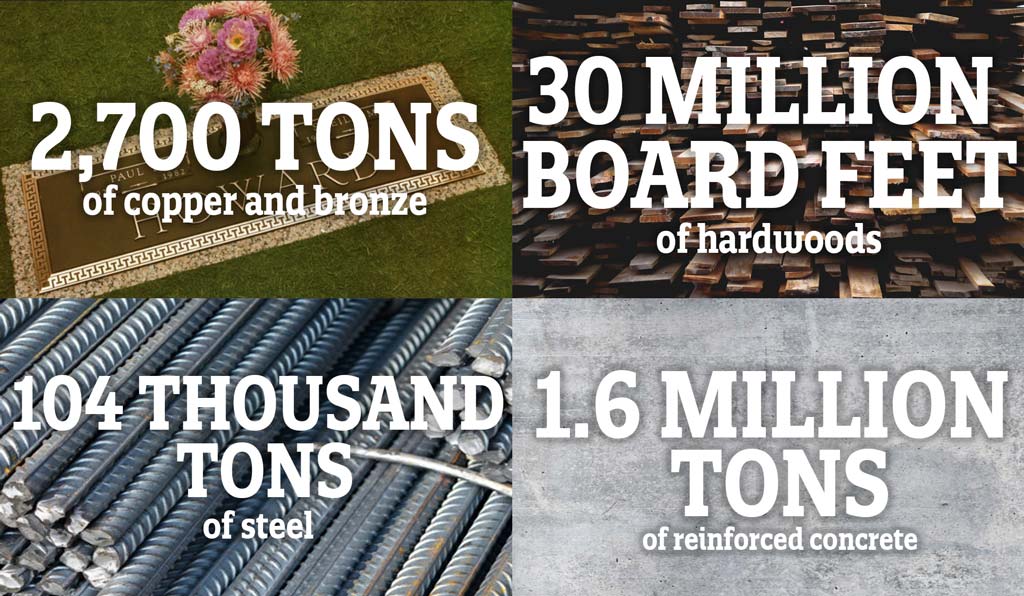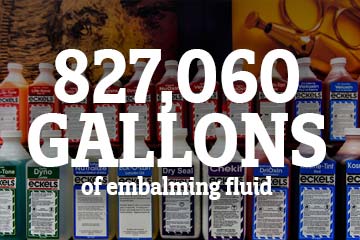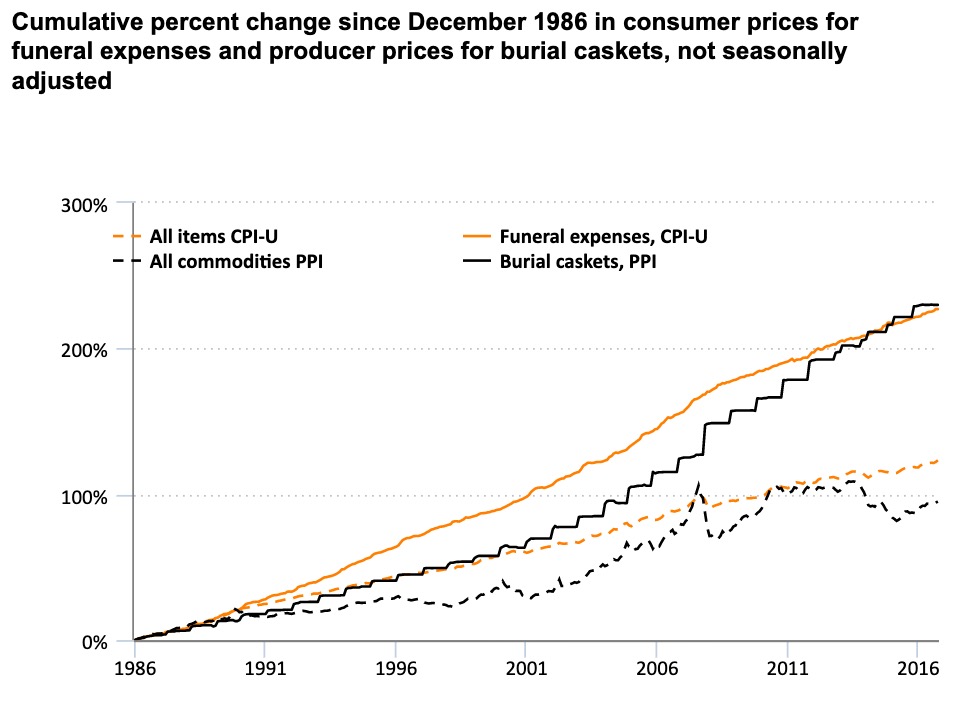
5 Reasons Why Cremation is the Right Choice
Millions of people pass away each year in the United States and over the past few years, there has been great concern - not just in America, but worldwide - about cities running out of space for cemeteries.
If you have been wondering about whether or not cremation or burial is the right choice for you, you're not alone. The choice of cremation has risen significantly over the past few years. Here are some things to consider that are likely to sway you towards the option of cremation.
1. Environmental Considerations
There are a number of environmental concerns when it comes to burial/internment versus cremation. Not only are we running out of space to bury the bodies of our loved ones, but - because of how funerals have evolved over the years - the amount of resources used in a traditional burial - on an annual basis and in the United States alone - are staggering.

Natural Resources
According to an article published by UC Berkeley's Planning Journal, today's conventional burials include approximately:
- 2,700 tons of copper and bronze
- 30 million board feet of hardwoods
- 104,272 tons of steel
- 1,636,000 tons of reinforced concrete
Sadly, experts point out that hardwoods have been "unsustainably harvested" and that these "high-value woods are increasingly limited." Since hardwood trees take years to grow, the environmental impact of losing so many of these trees is difficult to measure yet but experts say it will be evident in the coming years.
Chemical Leaching

The same report from UC Berkeley points out that each year in the United States 827,060 gallons of embalming fluid are buried with the deceased which poses some very significant health risks. The most common practice is to use formaldehyde which the US Environmental Protection Agency declared in 1989 as a carcinogen. Exposure to small amounts of formaldehyde can cause eye and throat irritation and high exposure can lead to death.
According to a New York Times article, the average funeral home embalms "about 150 bodies a year" with an average of three gallons per body of a formaldehyde solution.
Formaldehyde exists in the air around us and in many different products we use such as cosmetics or cleaners. One common source of formaldehyde is the exhaust fumes from vehicles. It can be inhaled, absorbed through the skin, or ingested.
Embalming fluid is not the only harmful thing that leaches into the ground and found in the soil near burial sites.
Scientists have reported that the natural process of decomposition in the ground, results in excessive amounts of chemicals like mercury and other harmful chemicals. These things are then leached into the soil and absorbed by nearby trees and plants. These changes, they say, will affect the environment for a very long time - as long as "for centuries to millennia" as cemeteries unnaturally concentrate these chemicals into relatively small areas.
Further, researchers found that chemicals from the woods and metals used in creating coffins resulted in elevated levels of minerals in the soil and groundwater, as well as elevated metal concentrations.
The Food and Agriculture Organization of the UN states that healthy soil is the foundation of our food system. With so many square miles of contaminated soil found in and around graveyards and draining into waterways, we continue to put our foods, animals, and our own health at risk.
CO2 Emissions
The World Resources Institute reported last year that carbon dioxide (CO2) is the "largest contributor to human-induced warming" and these emissions are at record levels.
Cremation does release some of these gases into the environment, however experts report that just the emissions from manufacturing and transporting a single casket releases "2,000 lbs of CO2" which is four times what is released in a cremation.
Elevated levels of CO2 contribute to significant environmental impacts ranging from higher temperatures to increased wildfires.
2. Spiritual Considerations
Whether the choice is for you or a loved one, peoples' faith and spirituality are unique and individual and must be considered. In the past, cremation was often considered to be blasphemous and was discouraged in many religions.
However, today, many denominations of the Christian faith have adapted their laws to allow for the cremation of a loved one. Catholicism, for example, began to allow for cremation in 1963 but within specific guidelines and Protestants, Hinduism, and Buddhism permit cremation.
Most faiths have begun embracing the idea of cremation for many reasons and the number of people opting for cremation over burial has increased dramatically over the past few years. The National Funeral Directors Association reports that the rate of cremation in 2015 surpassed that of burials, and they expect the rate of cremation to reach nearly 80 percent by the year 2035.
It's also important to note that cremation does not preclude a funeral, viewing, or memorial service. Depending on what you opt for, friends and family can still physically honor the passing of someone they love either before or after the cremation.
If you are unsure of your religious denomination's preference when it comes to laying a loved one to rest, talk with your minister to find out what is expected.
3. Logistical Considerations
Today's world is much different than in the past and there are many new and creative ways that cremation can afford families and friends options that are not only more convenient than a traditional burial, but very intimate and personal.
For example, it's no longer necessary to quickly have a service immediately after the death of your loved one, creating travel woes for far flung family and friends who might find themselves travelling across the country on short notice and have to miss work and school as many time the facilities for funerals are not readily available on weekends or holidays. Instead, a celebration of life with the cremation urn as a centerpiece can be scheduled for a time
Regardless of what you want to do, the beauty of it is that there is no need to rush to a decision on any of these things. As opposed to a burial, having the ashes of your loved one allows you time and space to make peace with their passing and put thought into what you wish to do.
Sometimes, it is comforting to be in the presence of the ashes of someone we love as we move through the process of grieving the loss of them from our lives. Whether you want to scatter the ashes in a sacred, special place or keep them close to you forever, the choice is ultimately yours.
4. Personal Considerations
Ideally, the way our passing is handled is something we have discussed and arranged with our loved ones and friends before we die. Of course, this is not always possible and the decision is left up to us to choose for someone else. It's important to take into consideration the individual's thoughts, beliefs, personality, etc. before making a choice about how to lay them to rest.
If you are trying to determine for yourself what the best option is for you, consider that cremation provides family members who are left behind with a less stressful option than that of a funeral which requires much more planning and expense. These affairs can be emotionally, mentally, physically, and spiritually draining for those going through mourning the loss of a loved one. Cremation allows space to breathe and mourn without the sometimes hectic hassles of funeral services.
5. Financial Considerations

The average cost of a funeral in the US is from $8,000 to $10,000 while cremation can be anywhere from $1,500 up to $7,000 or more, depending on what type of cremation you choose.
There are two different types of cremation - direct and traditional - and the cost of these things vary depending on the options and level of service you receive, and your region.
Traditional Cremation
You can choose traditional cremation if you wish to have a service prior to cremation.
Direct Cremation
This option involves very little in the way of funeral service. The body is cremated as soon as it is possible without viewing or visitation. Since there is very little added expense beyond the cremation, the average cost of this alternative is often around $1,000. Costs may be higher in rural areas where crematories are far away or competition is lower.
Cremation with Body Donation
According to AARP, there has been an increase in inquiries from individuals considering donating their bodies to science after death. In these cases, the cremation is paid for by the organization and the ashes are returned to the family within a few weeks.
Gravestone/Plot Costs
Without insurance, these costs can add up. The average cost for a gravestone can vary anywhere from $1,000 for a simple, flat stone up to more than $10,000
Depending on the location and region, burial plots can cost anywhere from $1,000 to $4,000 but can be even more costly in metropolitan areas.
From Keepsake Urns to beautiful walnut urns or themed urns, having a final resting place doesn't have to mean thousands of dollars spent on the plot and gravestone. These options can range anywhere from $14.95 and up. This, with the cost of cremation reduces the costs associated with funeral services considerably.
Perhaps Most Important
Traditionally, when someone passes, family and friends must make the trip to the grave site to pay their respects, replace flowers, or simply visit.
With cremation, the ashes can be displayed in a beautiful urn so that any time they need to feel close, it is there. This allows loved ones intimate time and space to grieve at their own pace in the comfort and privacy of their own home, which is another - perhaps even the most important - benefit to choosing cremation.


